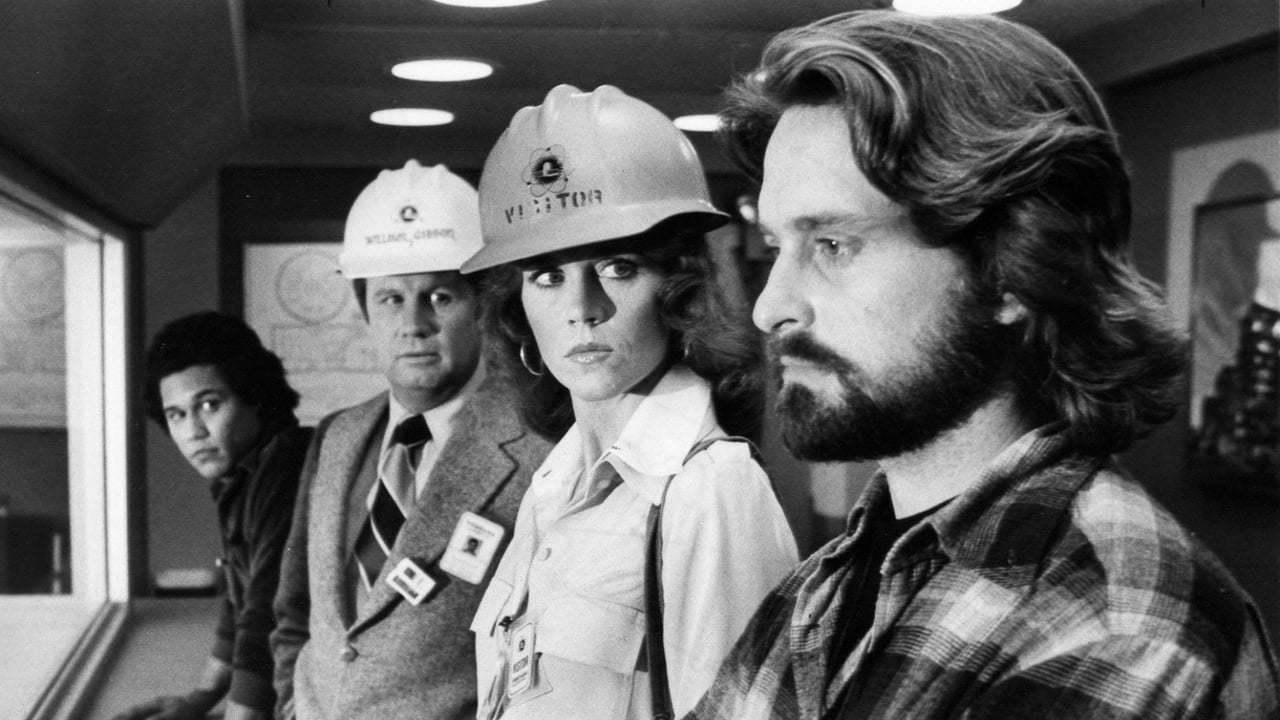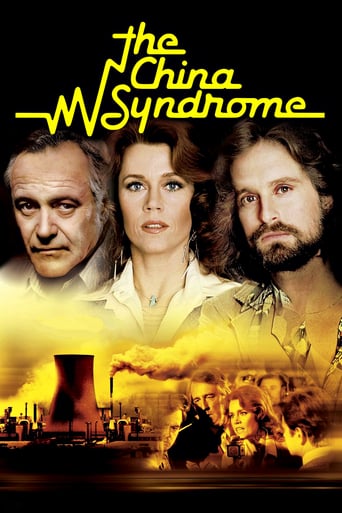

The movie's neither hopeful in contrived ways, nor hopeless in different contrived ways. Somehow it manages to be wonderful
... View Morewhat a terribly boring film. I'm sorry but this is absolutely not deserving of best picture and will be forgotten quickly. Entertaining and engaging cinema? No. Nothing performances with flat faces and mistaking silence for subtlety.
... View MoreThe film's masterful storytelling did its job. The message was clear. No need to overdo.
... View MoreOne of the film's great tricks is that, for a time, you think it will go down a rabbit hole of unrealistic glorification.
... View MoreIt was strange coincidence that when "The China Syndrome" was released, a real chemical industrial disaster occurred when the Three Mile Island Incident located in Dauphin County, Pennsylvania happened 12 days after the film was released. The ticket sales skyrocketed at the box office, but the industrial community gave this film a bit of backlash for misconstruing the movie to the real events that happened which resulted in pulling the film out from several theatre outlets. Many viewers though this was another James Bridges character studies of ordinary civilians going about their day-to-day duties crossing a path between going about with their jobs and the questionable situations regarding the ethics that come with their occupations.A film like this one would be hard to craft in today's market of filming, not just about the nuclear power plant situation, but about journalism from a feminist's perspective. The film's main language does consist of overpowering technical jargon that's easy if you have an engineering degree, but incoherent if you don't. We get an in depth look at the power station along with its fuel pellets and damping rods. The nuclear station emphasis mostly on high-tech applications like SCRAM, auxiliary feed valves and the titular China Syndrome which is a thing of great concern but not the radioactive annihilation the movie makes it out to be.In spite of all the paranoia and frightful concerns, Bridges has succeeds in adding little subtleties that make this film all the more satisfying and irresistible to watch. The sound effects are clearly at the top of the line when delivering a story. When the first alarm sounds off, is the perfect call to implement panic towards the characters and the viewers. It's really quite chilling. Then you have supervisor Jack Godell (Jack Lemmon)telling everyone to shut that alarm off but is aware from the start that something is just not right. Then we come to a bit of silence which is subtle and yet very disturbing sort of like we get the blood- curdling sound likely to make you go deaf and then it just stops and replaced by the building's rumblings and workers muttering words that lack in anything but comforting.The scenes Bridges feels more at ease is when he turns his attention to the broadcast studios mainly because Bridges started his career in broadcast journalism where we see the eventual boost in the career towards ambitious reporter Kimberly Wells (Jane Fonda). Fonda is really outstanding in her Oscar nominated performance as a reporter trying to cover more serious news coverage like this one but is sadly held back due to the narcissism of the newsroom and is only looked upon as eye candy. While this is happening, Bridges grills incompetent TV producers through their half-baked news segments and their chronic sexist ways while this heavy-hitting industrial catastrophe falling into becoming more dignified.Bridges makes his film come to life by adding more inventive ways to keep the chill factor alive in his movie without spoon-feeding his audience. The courier gets killed in fatal car crash scene is a nod to the infamous Karen Silkwood story. The exciting scene where Godell outsmarts his mysterious killers is the kind of thing Bridges wants as we watch a jittery person on his way to work while at the same shows his incredible exhibition of demolition driving.The climax of "The China Syndrome" was handled for better and worse is reasserted to archaic values. For example the main one is for the broadcast worker's job to gather as much news coverage as efficient and informative as possible. However, Godell can't give that much because he's only a plant supervisor and Wells is way too inexperienced to be caught up in the middle of the ruckus. Many thrillers before and after this one shows how complicated it is more important to gather information to the general public than hostages, weaponry or relics. And then we get the same routine where the brave but foolish reporter where she maintains her composure and to confidently claim that she knows exactly what she's talking about.At first impression, we don't get very to see except steel and glass, with the exception of browsing over Los Angeles interstate highways. But then Bridges adds the intensity of blinking lights, situation boards, some public relations joker informing the plant technicians that there's a snag and the system that needs urgent attention and we get blurry video footage of monstrous steel masses on the brink of collapsing. To top it all off, the stoic robotic sounds of the teleprinter printing out in step-by-step procedures of a potentially catastrophic disaster.
... View MoreJames Bridges' "The China Syndrome" is a movie that is unlike any other film that I've ever seen in the thriller genre until now and is arguably one of the best thrillers of all time in my opinion. The movie wasn't adapted from anything, and along with that it's arguably one of the most completely original thrillers of the 1970s. The movie stars Jane Fonda as a young news anchor named Kimberly Wells who works for a local Los Angeles news network who with the help of her cameraman Richard Adams (Michael Douglas) expose the problems of a nuclear power plant which are so dire that if nothing gets done to solve it, it could mean the end of our world. Wells and her cameraman then meet the shift supervisor of the plant who is a middle aged man named Jack Godell (Jack Lemmon) who is determined to expose the extremely dangerous problems in his plant that he loved so much. Bridges' direction is sure-handed and perfect for a movie like this, as well as his screenplay that he co-wrote with Mike Gray and TS Cook builds so much suspense with the expertly written dialogue that was so good that they got an Oscar nomination in the best original screenplay category as a result. The performances are rock solid especially from Lemmon who hasn't disappointed me every time I saw one of his movies and he ended up getting a best actor Oscar nomination for one his finest performances. I also found the performances by both Jane Fonda (who also got an Oscar nomination for best actress) and Michael Douglas (who also produced the film) to be so good that I'm convinced that nobody could have played their characters better than they did. The movie is also relevant then as it is now because the movie questions whether nuclear weapons can be a benefit or a danger to our world, and because we live in dangerous times like these of which we are living in now that ii is perfectly obvious that nuclear weapons are one of humanity's worst inventions. This is one of 1979's finest films.
... View More70's Hollywood made so many great contemporary political thrillers like "The Parallax View", "Three Nights Of The Condor", "All The President's Men" to name but three, but this one at the end of the decade I'd somehow missed. Of course everyone will know about the coincidence of the Three Mile Island incident which occurred within days of the film's original release which gave it instant topicality and of course gave it a commercial boost, but subsequent nuclear-related disasters at Chernobyl and Fukishama mean that the movie's relevance doesn't diminish as time goes by.All of that would be of no matter unless it wasn't a cracking good film which it certainly is. It's superbly cast for one thing not only with a dream-team of Lemmon, Fonda and Douglas in the main roles (all garnered deserved Oscar nominations for their work) but it's also well cast in the supporting roles too. The plot is convincingly believable at almost every stage with only the somewhat contrived melodramatic climax slightly at odds with what had gone before. The film makes telling points about corporate greed over safety considerations still relevant in every walk of business today, but also confronts the limits of free speech and obviously, the debate on the use of nuclear power as an energy source in today's society, but at a more basic level it's just a top-class thriller which ratchets up the tension throughout. The acting just couldn't be better, Fonda is convincing as the lightweight "feel-good spot" TV reporter who scents a real story for the first time, Douglas as the rule-bending maverick camera-man desperate to get the story out there and Lemmon in one of his last great roles as the company man whose loyalty is tested by his own conscience when he becomes aware of the cover-ups at the plant.Sure the fashions and depicted technology to name but two elements are dated as only a film set in the 70's can be, but the message of the movie combined with its entertainment value easily transcends these to deliver a taut, exciting and thought-provoking film which was one of the best of, in my opinion, a great decade for Hollywood movie-making.
... View MoreIt could still happen today. Still relevant with today's aging nuclear plants and terrorism threats. Terrific award-winning casting of Jack Lemmon, Michael Douglas and Jane Fonda, as the TV news reporter who wants to do "real news" stories. Low-key and believable in every way. Plant equipment breaks down. Stuck analog "needles" have happened before in real power plants. Almost a meltdown occurs as cooling water levels drop too low and the control rods start to fail. The plant tries a cover-up to no avail. It is all filmed by Douglas (the news cameraman) who almost loses his life over the footage! Also,a nuclear plant in Midland, Michigan had faked weld x-rays, just like in this movie. It was converted into a gas-fired power plant, as minor leaks in non-radioactive water lines are o.k. As everyone knows, in a "China Syndrome", the atomic core melts completely and burns thru "all the way to China." It's a figure of speech, of course! Released about 12 days within the time-frame of the real 3-Mile-Island disaster and not unlike Chernobyl and that new disaster in Japan. None of these 3 places will be safe areas in our lifetime. A great "little" movie with no "monsters" or other such nonsense!
... View More